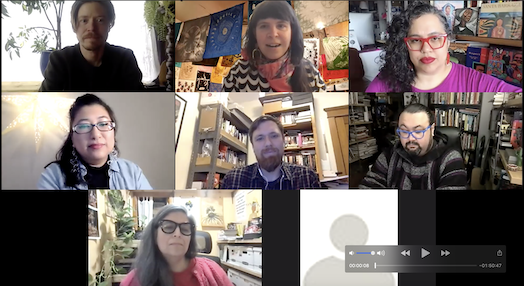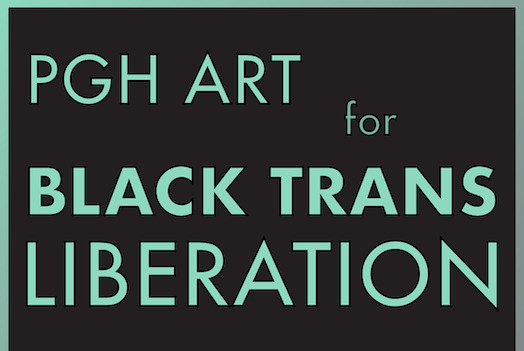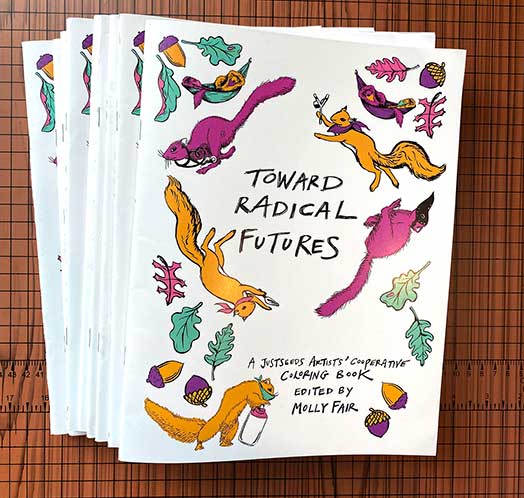Pittsburgh is in many ways a small town. I went to a University of Pittsburgh Street Law class last night to show-and-tell rad youth printing projects to possibly incorporate into the curriculum they are writing for high school students. I met and talked at length with education professor Noreen Garman. She mentioned that a piece she wrote defending Bill Ayers would be in the Pittsburgh Post-Gazette today. I was forwarded the unedited version, which I am including here. It’s a smart assessment of the 1960’s and talks much of the possibility within all people to change. I was really moved by it.
Possibility is indeed the secret heart of time.
William Ayers and the American Character
Noreen Garman and Anna Klaman
University of Pittsburgh
October 13, 2008
November 5th will bring a merciful respite from the incessant drumbeat of political campaigning and a new administration turning toward the challenges of the future. Unfortunately we are left with some unsavory residue, including a worn cardboard image of Dr. William Ayers, a ‘60’s anti-war activist. Through a major strategy, headlined as the Obama/Ayers Connection, the McCain advisors, with half truths and specious lies, managed to frame Dr. Ayers, as an unrepentant bomber. Over the past weeks Bill Ayers has become a generic synonym for “terrorist,” a political brand name used by the Republican campaign to question Obama’s judgment and character. Obama admitted that he served on community committees in Chicago with Dr. Ayers, a university professor and community organizer, but that he was only eight years old when Ayers engaged in activities with the Weather Underground. The various media continued to report, hourly, the McCain strategy. It was heightened by candidate Palin’s shouts at her rally, that Obama “is palling around with terrorists.” The liberal media lapped up the strategy, reporting McCain ads and speeches where both Palin and McCain worked the crowd as they invoked the rhetoric of fear and nativism. Chris Mathews, Frank Rich and others chastised McCain by claiming his strategy had gone from tough negative campaigning to inciting vigilantism. Sadly, however, the unyielding McCain strategy, accusing Obama of radical associations, and the liberal media’s counter to the accusations, continued through the final debate.. All parts of the national and local media have been relentlessly using the Bill Ayers brand and, as such, instantiating Dr. William Ayers as the “unrepentant domestic terrorist” that represents the worst of the ‘60’s.
What is clear in the popularity of the William Ayers brand is how difficult it has been for the country to come to terms with that time in history. The 1960s were the best and worst of times. They were difficult in that a generation of Americans had to redefine our sense of what it meant to be at war. Our fathers gently laid upon our shoulders the heroic memories of their service in World War II—a legacy characterized by equal parts of honor and pride, grief and horror. They bequeathed to us their strong sense of nobility for having defeated an evil of such proportions that it defied the very essence of what it meant to be human. We grew up viewing our nation through their eyes, where the forces of good triumphed and fascism crumbled when faced with the light of righteousness.
Yet, in the Viet Nam War era, everything was different. Daniel Ellsberg’s Pentagon Papers revealed that we were the aggressor, rather than the peasants of North Viet Nam as we had been told. For many of us, who were studying in universities in the late 1960s, the potential for evil emanating from what Eisenhower called the “military industrial complex” led us to explore Marxism as a kind of utopian antidote to the excesses of consumer society. We believed that those who resisted imperialism in Southeast Asia were fighting for their freedom; and the nation our fathers had taught us to revere seemed to be on the wrong side of a war of liberation.
But it was the best of times as well, because we believed that we could change the course of events, stop the killing, and redeem the nation we loved. We had been taught that patriotism was deeply embedded in the American consciousness, and to be a patriot—like Thomas Jefferson, John Adams, Abraham Lincoln, Sojourner Truth, Frederick Douglass, and Martin Luther King—meant to stand strong in the face of injustice. From this standpoint we felt it was a moral imperative to join the struggle to end the war. Perhaps it is true that the protests played some small role in Nixon’s decision to withdraw from Viet Nam; but there was a cost; times when our generation lost sight of the noble goal of nonviolent resistance and succumbed to the seduction of becoming that which we most despised.
Some of us stopped listening to those who might disagree with our point of view.
Some of us allowed our struggle to foster class conflict and used our rhetoric to belittle those who had not had the privileges of money and education that we had not earned but had been handed to us by our parents.
Some of us used the anti-war movement to sink into narcissistic hedonism—deluding ourselves into believing that drugs and sex represented resistance to oppression, our own version of the big lie.
Some of us saw violence as the only course of action that could change the nation’s trajectory into a spiral of self destructive global aggression.
Some of us carry a wound and a shame for the way we treated our returning soldiers—young people just like us who took a different path and who believed that they were defending our freedoms in the jungles of Viet Nam. In the end, some of us discarded the utopian beliefs that had guided our resistance and joined the silent majority.
Some of us continued to work for change.
It has been difficult to watch as Senator John McCain and his surrogates engage in a campaign of lies and half truths targeted at Dr. William Ayers. Perhaps we should be desensitized to such tactics after living for eight years with the politics of character decimation that has characterized our public discourse in the time of Rove and his acolytes. We thought Senator McCain, having himself been vanquished by Rovism in 2000, might have resisted the impulse to slog through the slime, but it seems we were wrong. McCain’s apocalyptic soothsayers of doom have raised the specter of Professor Ayers’ activities as one of the founders of the Weather Underground to frighten the voters into doing what is against their best interests and the best interests of the nation. Yet, it is important to wonder if these vicious forays into the past are far less a reflection of Senator McCain’s concern about the character and judgment of Senator Obama and much more a window into what the candidate perceives to be the true character of the American people.
It is fitting that some in the media are attending to John McCain and his tactics in mid-October. This is, for Jews around the world, the season of atonement. Most cosmologies, whether it is through prayer, confession, or meditation, ask us to search within and to express the sacred qualities to be found in each individual soul, thereby opening the door to the possibility that we can move beyond our transgressions to live a better life. It is this possibility that makes us inherently human. For redemption is more than forgiveness, it is a commitment to atone for those qualities within ourselves that impede our progress to become something more than we are. To imagine a life without the possibility of redemption is to succumb to despair, for each of us is flawed and we must forgive ourselves so that we can create lives that express that which is most clearly good and noble. We know Bill Ayers personally as a cherished colleague of twenty years. We recognize where he has been viciously misquoted by McCain and the media in order to claim that he is “unrepentant.” Yet the subtext of his 2001 book, Fugitive Days, reflects a narrative of atonement. We’ve witnessed the inspiration that his work has engendered. Thousands of his students, colleagues and friends know him as an education reformer, a dedicated teacher, an advocate for those children who have the least power to recover from the vagaries that life sometimes inflicts upon those most vulnerable. He doesn’t seek the glare of publicity to flaunt his good works but lives his life in active dedication, writing books that teach others to give voice to those who have been silenced. It is a life that is emblematic of nonviolence and peacemaking.
Of course, those of us who recognize scapegoating when we see it know that John McCain’s inflammatory rhetoric about Dr. Ayers is not really about a sixty-something college professor working in Chicago. Sadly, Senator McCain is flooding the airways with a clear image of the American people as a nation that has rejected the possibility of redemption. He seems to see us as a people who can only respond from a place of bitter cynicism that says we are nothing but the echoes of our past. He offers an image of a people who cannot forgive each other and cannot forgive ourselves. John McCain, who many say is fundamentally a good man, has lost his way. We are writing to assure him and those who think as he does that if we seem to be cynical it is because our leaders consistently underestimate our capacity for compassion and forgiveness and our willingness to embrace the possibility of change.
Senator McCain can still redeem himself by denouncing these attacks. For if the choice is between the best and worst of times, it is time for the nation to choose its best.







